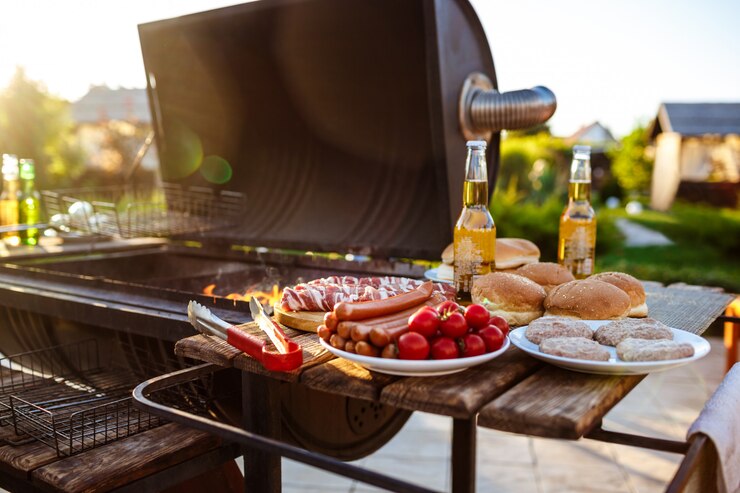When it comes to grilling, the age-old debate between charcoal and gas is a familiar one. Charcoal enthusiasts swear by the smoky flavor and traditional experience it brings, while those who favor gas appreciate the convenience and control it offers. In recent years, cooking BBQ with gas has emerged as a game changer in the world of outdoor cooking. This article explores why BBQ with gas is not only transforming the grilling experience but also making it more accessible and enjoyable for everyone.
The Convenience Factor
One of the most compelling reasons to switch to cooking BBQ with gas is convenience. Gas grills ignite with the simple turn of a knob and a push of a button, eliminating the need for lighter fluid, matches, or kindling. This ease of use makes it possible to fire up the grill quickly, allowing for impromptu gatherings and spontaneous cookouts.
Moreover, gas grills typically heat up faster than their charcoal counterparts. This means less waiting time for the grill to reach the optimal temperature, and more time spent enjoying your meal and socializing with friends and family. For those with busy schedules or a penchant for convenience, this is a significant advantage.
Precision and Control
When it comes to grilling, temperature control is crucial. One of the standout benefits of cooking BBQ with gas is the precise temperature control it offers. Gas grills come equipped with adjustable burners, allowing you to set and maintain specific temperatures with accuracy. This is particularly important for dishes that require different cooking temperatures or when you want to cook multiple items at once.
Charcoal grills, on the other hand, can be more challenging to control. Achieving and maintaining the desired temperature often requires experience and skill, as the heat can fluctuate based on factors like the amount of charcoal and air flow. With a gas grill, you can avoid the guesswork and focus on perfecting your grilling techniques.
Consistency and Reliability
Another advantage of using gas for BBQ is the consistency and reliability it provides. Unlike charcoal, which can vary in heat output based on the quality and quantity of the coals, gas grills deliver a steady and consistent heat source. This reliability ensures that your food is cooked evenly and reduces the chances of undercooking or burning.
Consistency is particularly valuable for those who take pride in their grilling skills and want to replicate their successes time and time again. With a gas grill, you can achieve similar results with each cookout, making it easier to impress guests and refine your techniques.
Cleaner and Healthier Cooking
Cooking BBQ with gas is also associated with a cleaner and healthier grilling experience. Unlike charcoal, which can produce ash and potentially harmful chemicals, gas grills leave behind less residue. This means less cleanup after cooking and a more environmentally friendly option.
Furthermore, gas grilling eliminates the need for lighter fluids and other chemical additives that can affect the taste and safety of your food. By using gas, you can avoid potential contaminants and ensure that your meals are as healthy and natural as possible.
Versatility in Cooking
Gas grills offer impressive versatility, allowing you to experiment with various cooking methods. Many gas grills come with additional features like side burners, rotisseries, and even integrated smokers. These features expand your cooking options beyond traditional grilling, enabling you to prepare a wide range of dishes from stir-fries to roasted vegetables.
The ability to cook different types of food and use various techniques on a single appliance enhances the overall grilling experience. Whether you’re preparing a simple weeknight dinner or an elaborate feast, a gas grill can adapt to your needs and preferences.
Fuel Efficiency and Cost
In terms of fuel efficiency, gas grills have a clear advantage over charcoal grills. While the initial investment in a gas grill might be higher, the ongoing cost of propane or natural gas is often lower compared to purchasing charcoal regularly. This makes gas grilling a more economical choice in the long run.
Additionally, the efficiency of gas grills means that you can control the amount of fuel used more precisely. This helps to minimize waste and ensures that you’re getting the most out of your fuel.
Safety Considerations
Safety is always a top priority when grilling, and gas grills generally offer a safer grilling experience compared to charcoal grills. The controlled flame and consistent heat of a gas grill reduce the risk of flare-ups and unpredictable fires. Many gas grills are also equipped with safety features such as automatic shut-off valves and temperature control systems, further enhancing their safety.
Charcoal grilling, while traditional, can involve more risks due to the open flames and the potential for uneven heating. Gas grills mitigate these risks and provide a safer option for outdoor cooking.
Conclusion
Cooking BBQ with gas is undeniably a game changer in the realm of grilling. The convenience, precision, consistency, and versatility it offers make it an appealing choice for both seasoned grillers and novices alike. With its cleaner and healthier cooking environment, cost-efficiency, and safety features, BBQ with gas provides a modern solution to traditional grilling challenges.
For those looking to elevate their grilling game, embrace new culinary possibilities, or simply enjoy a hassle-free cookout, investing in a gas grill is a decision that pays off in many ways. As the grilling landscape continues to evolve, cooking BBQ with gas stands out as a transformative option that enhances the grilling experience for everyone.





Comments